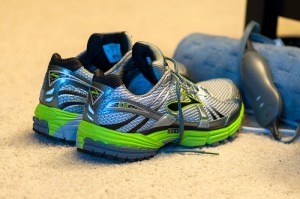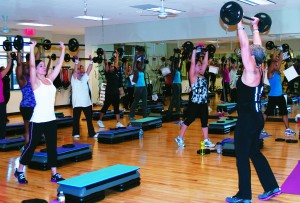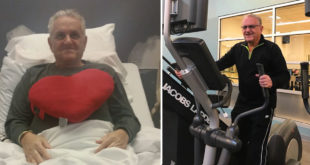by Michelle Sutton-Kerchner
A bright, sunny day can do more than affect our mood. The weather contributes to overall health in many ways. Perhaps that mysterious condition you suffer isn’t such a mystery …
Human Biometeorology
The concept sounds intimidating. Yet, human biometeorology is simply the interactions between our body and the atmosphere. The wind chill factor is a common outcome of biometeorologic studies, where science closely can predict how a cold temperature feels to the human body, despite what an outdoor thermometer reads.
Concerns are growing about the environment and consumption of chemicals used in modern day agriculture. A combination of knowledge and organic farming has society trending back to nature. Herbal supplements abound. Entire stores are generated from their demand. We look to the earth for remedies. Perhaps we should glimpse the sky for prevention.
Weather Predictions
That ache in your knee may better tell the forecast than AccuWeather. You can practically sneeze on demand during a breezy spring day. There you have the pollen count. Indisputably, the weather affects us, directly and indirectly. It’s responsible for the pollen count, the barometric pressure, and, often, your day’s activities.

Shivering in the cold and sweating on a hot day are obvious reactions. However, weather shifts can also cause subtle changes. Temperature, barometric pressure, humidity, winds, and solar radiation are ingredients for what may be brewing in your body. Atmospheric indicators can hint at what is troubling you. Use this information to help your body weather its storms.
When Lightning Strikes
Emergency department visits for asthma attacks have been shown to increase during thunderstorms. Turmoil in the atmosphere is thought to increase the number of spores in the air, which then are split by lightning and stirred by wind.
Once possibly considered a reaction to angered gods of the sky, today, we have strong scientific evidence to correlate this troubled breathing with thunderstorms. If you suffer from asthma, know the forecast. If storms are developing, bring your inhaler and remember your medicine.
A Laborious Tornado
Ready to deliver your baby? Forget old myths about how to trigger labor. Tornados are a proven trigger. According to a study out of Bowling Green University, there is an increase in the onset of labor before a tornado hits. A rapid decrease in atmospheric pressure is considered the cause. Just like Dorothy and Toto, these women suddenly find “They aren’t in Kansas anymore.”
Cold Hearted
For those with heart conditions, cold weather may signal the need for closer monitoring. Studies have shown a connection between frigid temperatures and heart attack and angina. During cold weather, blood supply to the heart wall decreases, which can lead to trouble for those with a compromised heart.
Muscle and Joint Aches

As many with chronic pain attest, the weather exacerbates inflammation and irritation. Surprisingly, there is not solid scientific evidence to prove this connection, but it certainly exists. Dr. Thomas Sculco, director of orthopedic surgery at the Hospital for Special Surgery in New York, theorizes, “In cool, damp climate, the muscles are probably more irritable and prone to spasm. Also, the blood supply to muscles may be diminished. Those who have had surgery or a joint injury will feel changes in barometric pressure in the affected joint. It’s not known why.”
Consider wearing a scarf around your neck or legwarmers around knees during cold, damp days. Keep the troubled area warm and protected from the elements. Perhaps use a topical or oral anti-inflammatory medication.
Headaches
Allergies, colds, and infections increase sinus pressure. Often, this leads to headaches and facial pain. It isn’t surprising that shifts in barometric pressure, the air all around us, trigger shifts within our body. On these days, you may find better headache relief from allergy medication than an analgesic.
Although research hasn’t proven the connection yet, organizations like the National Headache Foundation confirm a drastic increase in migraine-related complaints when a weather front comes through, especially if it brings a big change. Research suggests a change in the number of small air ions, and the ratio of positive to negative ions, alters with changes in barometric pressure. These changes may affect the body’s serotonin levels, which can affect migraine activity.
Track migraine incidents. If they seem weather sensitive, be cautious on those days. Avoid triggers, including offending foods. Keep medicine at the ready. Sometimes, early treatment can prevent the severity and duration.
Mental Outlook
A sunny disposition is easier to accomplish when the sun is, indeed, shining. We don’t need science to confirm a string of rainy days takes its toll on our spirit. Rain and clouds are often synonymous with glum.
Some individual’s mental health is more affected by the weather and seasonal shifts than others. Seasonal affective disorder (SAD) is a recognized mood disorder triggered by the change of seasons, based largely on weather and the amount of daylight. Although SAD is often associated with winter blues, it can strike year-round, including during summertime. Summer depression is sometimes called “reverse seasonal affective disorder,” with symptoms thought to onset by the hot weather.
Depression can occur simultaneously with other disorders, including anxiety, attention deficit hyperactivity disorder, and obsessive compulsive disorder. Depression can be affected by atmospheric conditions; therefore, linked disorders may be exacerbated by weather patterns as well.
For information on SAD, please see “Exercise Your Way to Happiness (even when it’s dark at dinnertime) at www.fitnessandwellnessnews.com (November 13, 2009).
Taking It to the Next Level

Some conditions are more solidly connected to weather patterns than others. However, enough research and evidence inspired two pioneers to create a weather-health Web site, MediClim. General Practitioner John Bart and his patient, Meteorologist Denis Bourque joined a Canadian study team that linked weather patterns to hospital emergency department visits. They teamed with other health professionals and mapped weather conditions known to trigger health issues.
Today, this information is offered to the public via their Web site. Subscribers receive e-mail alerts of potential weather-induced health issues. One subscriber reports up to 90 percent accuracy from the service, which allows her to preplan days on which she will likely suffer a migraine. The site’s mission is to help people prepare for the possibility of a bad health day, and perhaps avert serious outcomes.
If you notice a weather sensitivity, track it in a journal. Note weather patterns to determine if they affect any health conditions you have. A health issue may not originate from the weather. However, weather can exacerbate symptoms. Share this information with your healthcare provider, including the Center nurse. It can help make a diagnosis and create an effective treatment plan.
Speaking of Temperatures

The human body often thrives in warm weather. Heat helps stiff joints and achy muscles melt away tension.
Bring on the heat– stop in for a Group Fitness HEAT class. Sometimes referred to as Ultimate Fitness, Body Blast, or Boot Camp, these Group Fitness classes offer a powerful routine to keep your body at its best, whatever the weather. As its name reveals, HEAT stands for “high-energy athletic training.”
“These classes are heated up with dynamic moves and drills. They are hot,” exclaims Fitness Manager Debbie Heinz who has been teaching HEAT for 20 years. The high-intensity can be challenging at any level. The variety is distracting enough to occupy your mind and keep you pumping. There isn’t time to think about being tired as one song melds into the next.
Debbie enjoys the creative aspect of HEAT class, in particular. “Each class is choreographed differently. Some include rebounding, kickboxing, step class moves, and other drills. You never know what you’re going to get, just that it will be intense,” shares Debbie.
She emphasizes these are not dance classes. The choreography involves taking what may be mundane and making it fun and intense. It splices together cardio and toning exercises to make a fresh routine. It’s never the same class twice.
Member Cathy Gugliucci shares her heated experience, “Whenever I have a day off from work, I take the opportunity to try a new class. I decided to try the HEAT class. What a challenge it was for me, but a thoroughly enjoyable one! Everything worked — the routines, the music, the instructor. The whole class moved as a single unit.”
A recent HEAT class involved rapid skipping in a circle around the room. “We went so fast, the movement mimicked athletic skating. Everyone loved it. It was a heated drill.” Debbie choreographs each class the night prior to teaching it. She, too, is often surprised at what develops.
If you don’t sweat it out in an intense toning and cardio craze, find assurance in whatever exercise routine you choose. Wellness, healthy living, is a multidimensional goal. A commitment to fitness helps ease the body and mind, in all kinds of weather.
We live in this world. We are affected by all that transpires within it.
Sources
“Forecasting Illness: The Weather-Health Connection” by Tina Coleman at www.beliefnet.com and www.al-hikmah.org.
“The Connection Between Weather and Health,” at www.thirdage.com.
“Understanding Summer Depression,” by Barbara Mellville at www.suite101.com.
Image Credits
Sunny flower fields: http://www.flickr.com/photos/audreyjm529/509639635/
Sneaks and heating pad: http://www.flickr.com/photos/bradhoc/6903548766/
 Fitness & Wellness News Your Source for Fitness News, Wellness News, Health News, and Nutrition News!
Fitness & Wellness News Your Source for Fitness News, Wellness News, Health News, and Nutrition News!



